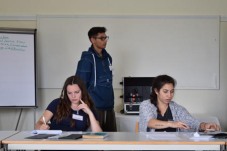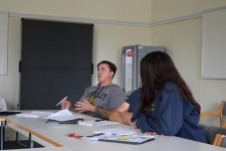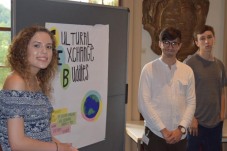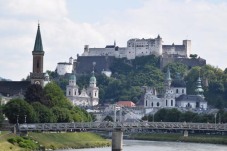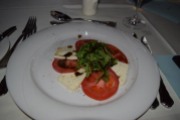Sixteen students and their Faculty Advisor, Dr. Tim Kelly, are attending the Global Citizenship Alliance‘s Global Citizenship Seminar for students in June 2018. Follow their adventures in this extended entry as Dr. Tim Kelly and the students detail their observations.

The students are Hannah Curley, Savannah Marez, Mahdis Gheibi, Rafael Alva, Aaron Minkoff, Mitch Brown, Anahita Said, Shantik Azima-Taylor, Yasmeen Faris, Ian Yin, Ana Hahs, Angelina Yin, Andrea Morrone, Liz Maglio, Rosa Chapman, Nguyen Le.
Salzburg Conference – 6/13/18 – Day 1

“Framed by mountains, crowned by the Hohenzalzburg Fortress and divided by the turquoise Salzach River, the Salzburg landscape is pure drama.”
– Frommers
It’s surprising that the best quote to describe a city as old and with as much culture as Salzburg is from a travel guide.  Regardless, this is a city that is beloved for many reasons. Mozart fans flock to this musician’s birthplace. There is no better city in the northern Alps which illustrates the baroque architectural style as this UNESCO World Heritage site. Or maybe you just love the Sound of Music which was filmed here. But it is neither music nor architecture that compels our current stay in Salzburg; rather it is global citizenship, and West Valley College has sent 16 students to the conference to learn what that term means and what they can do to promote its ideals.
Regardless, this is a city that is beloved for many reasons. Mozart fans flock to this musician’s birthplace. There is no better city in the northern Alps which illustrates the baroque architectural style as this UNESCO World Heritage site. Or maybe you just love the Sound of Music which was filmed here. But it is neither music nor architecture that compels our current stay in Salzburg; rather it is global citizenship, and West Valley College has sent 16 students to the conference to learn what that term means and what they can do to promote its ideals.
The adventure for our WVC students actually began before they arrived. Flight delays out of SFO, horrific weather in Germany and Austria (summer thunderstorms unlike any in recent memory), and a slow process in Customs at the Frankfurt airport all led to them missing their connecting flight to Salzburg. Forced to take a different flight to Munich, once they arrived the weather kept them on the plane for an additional hour since the airline didn’t want to deplane during a lightning storm. They then had to take the 40 minute train ride to Munich’s downtown railroad station, and then another 2 hour train trip to Salzburg. It wasn’t until 11:30 pm that they reached their hotel, and they finally got dinner around midnight. Welcome to Salzburg!
A traumatic experience? Perhaps. But on the upside, it was also a bonding experience for them. When the airline tried to split them up onto two separate planes to different destinations, the students demanded that they all be on the same plane. That shows a real commitment to the welfare of the group, and that no matter what happened, they were going to stick together.

As in years past, the conference is once again being held at the Schloss Leopoldskron, a palace originally built in 1736 (I talk more about the history in last year’s blog if you are interested: https://wvcglobalc.wordpress.com/2017/05/19/missives-from-salzburg-austria/).


Students are told the significance of the bullet holes from WWII in the Chinese Room, while in the Dining Hall students hear about the grand activities that once occurred there.
Our students were clearly impressed by the beauty of the location as they were given a tour of the facility before dinner.


Ian poses with the Burger Supreme Court while Nguyen points out his likeness to the cherub.
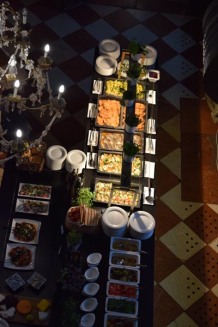

Liz and Mahdis try out the Austrian delicacies at dinner.
The meals are spectacular and the accommodations comfortable, but a junket to Austria is not the goal of this Study Abroad Trip.


Students grapple with the concepts of globalization, culture, ethnocentrism, and global citizenship that Astrid Schroeder, Chief Operating Officer and CFO of the GCA, laid out for them in the opening session.
The students started working on the first day, attending an opening session laying out what the goals of the conference are, and then splitting up into two groups (composed also of their fellow conference attendees from Central Michigan University) to start fleshing out definitions. What does globalization mean? How can we define culture, race, class? The students attending this conference are compelled to recognize the fact that they are of a privileged status (for how many people ever get a paid Study Abroad trip to Austria?) Do they therefore have a greater responsibility to promote global citizenship? To take a leading role? The group discussions were spirited – at times testy – in their give and take, but always respectful. Faculty advisers are instructed to let the discussions go where they will, stepping in only when necessary to keep a particular focus or encourage others to participate. I’ve been very impressed with the level of discussion from our students and am encouraging them to be more engaged with the Michigan students so that they can get different views outside of the Bay Area Bubble.
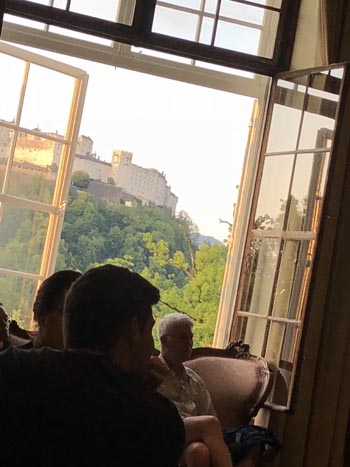
A view of the fortress from outside our lecture hall window.
If plagiarism is the best form of flattery, then let me plagiarize one of our speakers on the opening day: global citizenship is not a spectator’s sport; it’s a participatory sport. This conference seeks to teach attendees how they can participate as a global citizen. But what is a global citizen? Well, that’s the question this conference seeks to answer. As for myself, I will do my best – with hopefully posts from our students – over the next six days detailing in this blog how well our Vikings are dealing with that question.
STUDENT IMPRESSIONS
From Liz Maglio: “The first travel day was hectic to say the least. But with a sense of relief we made it to the Schloss, armed with a keen enthusiasm for discourse and a yearning to experience foreign lands as we spent the better part of our morning exploring the palace grounds. Our foursome was not cowed by the rain. Instead we posed with the statues, tiptoed through puddles, and gazed with awe at the picturesque scenery of Salzburg.”


Liz, Angelina, and Ana are singing in the rain.
Salzburg Conference – 6/14/18 – Day 2
Greetings from Salzburg on our second day!
Obviously a key element to any Study Abroad Program is to foster interaction with a local population. While the conference itself is conducted almost entirely by Europeans, all of the student participants are from the United States; so the interaction has got to come largely from venturing out beyond the compound walls of this 18th century palace and into the community.
Yasmeen, Angelina, and Andrea play hide and seek across the river, while Hannah offers peace strolling through the old quarter of town.
Fortunately the old town of Salzburg is no more than a two mile walk (up a very steep hill), and so the morning of the second day is devoted to exploring the city. Our students wasted no time in doing so, visiting the fortress that dominates the skyline above the Schloss, as well as the shops, museums, and plazas that Salzburg has to offer. Shantik in particular has talked non-stop about how much he learned from the Mozart Museum!


“Team Mitch” (Andrea, Angelina, Yasmeen, Anahita, Mitch, Aaron, Shantik, and Rafael) take a stroll into town to see its sights.
Rosa, Ian and Nguyen explore Mirabell Gardens.
The point is that ethnocentrism can be combatted when you leave your own country and see how others live in theirs. This is one of the great values of having this conference in another country. Yes, these are topics (culture, world poverty, globalization, populism) that our students can (and do) learn about in American classrooms; but hearing a European lecturer discuss the dangers of nationalism while at the same time in a country that is dealing with this issue in response to the migrant crisis across Europe has credence. It particularly resonates with students when an “outsider” explains how the United States is viewed by the outside world, and this has even more resonance when it is explained outside of the United States. There is no question that you learn far more about your own country when you are overseas than you do the place you are visiting.
By mid-afternoon it was back to work, and our students are working hard indeed. The lecture schedule is intense but with lots of interaction between students and the lecturers. Students have also been split up into three permanent work groups in which they will be required (working with their Central Michigan University comrades) to develop a plan of action that seeks to promote global citizenship back home in their communities (more on that in the days to come).
Understanding that the best way for students to learn is to involve them in that learning process, the conference employs a variety of techniques during the lecture sessions. One segment focused on how world maps can illustrate a level of ethnocentrism, so even before the lecture began students were asked to work in groups and draw a world map from memory.

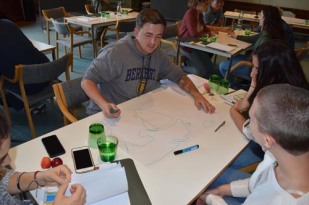
Mitch takes a cubist approach to his group’s map, while Aaron draws a wolverine to represent Euroasia.
The maps that were produced were…interesting. Continents were misshapened and islands were missing, but each map had a decipherable United States, often drawn first on the map (i.e., as the point of reference) and the only nation with a definable border. Why? Because this is the country American students are most familiar with while other continents were drawn along the margins.


Savannah, Liz, and Shantik all work with their Central Michigan teammates.
It was definitely an “aha!” moment for the student participants. If we can understand the cultural meaning behind the map, we are that much closer to understanding the interrelationships (both domestic and international) fostered by globalization.
Fortunately, there are many more “aha” moments to come before this conference comes to an end.
Salzburg Conference – 6/15/18 – Day 3
One of the most – if not the most – valuable characteristics of the Global Citizenship Alliance Conference is how current its topics are. This year is no different, focusing on the surge of populism and nationalism around the globe in response to the changes of globalization. What were the factors which led to the elections of Donald Trump, the Brexit vote, and anti-immigrant governments in Austria, Hungary, and Italy? These are issues that global citizens are dealing with in real time. Globalization is therefore a key theme in understanding these populist movements.
Several times students have come to me after a lecture and asked, “So was he in favor of or against globalization?” The beauty of this conference is that the speakers are by and large not putting forward a “hit you over the head with a hammer” position. The goal of the conference is to spark debate and discussion; and most importantly intellectual curiosity. The speakers are often i ntentionally vague as to their personal positions because they want students to form their own views based on the information provided.
ntentionally vague as to their personal positions because they want students to form their own views based on the information provided.
That’s not to say that GCA speakers are putting forward a position which says, “let’s look at the good and the bad of discrimination against immigrants.” There is no good side of intolerance. The goal of global citizenship is to promote social justice. Today’s lecture on the “city” sought to do this by helping students understand the historic role that urban centers have played in advancing technologies, attracting migrants, and defining the contentious issue of citizenship.
You can be especially proud (as I am) of our West Valley College students who have taken lead roles in these discussions, both at the group and lecture levels. They are not afraid to challenge these lecturers (who of course are not afraid to push back, forcing our students to either reevaluate their positions or make a rebuttal). They have jumped into the poster assignment  with enthusiasm, eager perhaps to top last year’s presentation posters from WVC alumni to the conference. I’m looking forward to seeing where this good natured competition with last year’s class takes us.
with enthusiasm, eager perhaps to top last year’s presentation posters from WVC alumni to the conference. I’m looking forward to seeing where this good natured competition with last year’s class takes us.
Tomorrow we head off to Dachau Concentration Camp. Our WVC students are well prepared for this (as prepared as anyone can be for such an experience) after I required that they read Elie Wiesel’s Night. I again expect that they will take the lead in group discussions after the trip.
Salzburg Conference – 6/16/18 – Day 4

Today we went to Dachau. I detailed my own personal experience in last year’s blog which can be accessed here: https://wvcglobalc.wordpress.com/2017/05/19/missives-from-salzburg-austria/ (scroll down to 6/15/17 – Day 4).
 I asked students to enter the camp as a group (after all, they stuck together even during the difficult times of flying into Germany); but the group soon separated almost immediately upon entering through the famous “Arbeit Macht Frei” (Work Will Make You Free) gate. Some paired up while others went off on their own. It was the result that I expected as even with a smaller group of only 8 students last year, the group splintered quickly.
I asked students to enter the camp as a group (after all, they stuck together even during the difficult times of flying into Germany); but the group soon separated almost immediately upon entering through the famous “Arbeit Macht Frei” (Work Will Make You Free) gate. Some paired up while others went off on their own. It was the result that I expected as even with a smaller group of only 8 students last year, the group splintered quickly.
Below are the reflections of our students as sent to me by e-mail. Some have been edited for purposes of brevity. Some of the photos here are also taken by our students.
Nguyen Le
Although I stayed home for the Dachau trip today due to some unexpected circumstances, I still got some pictures from the group and listened to the reflection session and stories about Dachau concentration camp. It is hard for me to imagine how all this could happen back then in WW2. It gives me a little chill and depression just to think how these POWs, Jews, and other races/ people were treated in the camp. However, it is good that the camp was liberated by the Allies who then provided assistance to make buildings and churches as a memory site for them.
Ana Hahs
 It is impossible to walk through a former concentration camp and not feel out of place. There is a sense of wrongness that comes from tramping over ground where so many suffered and died. But I realized that’s the point. Dachau and other memorials exist to remind us of the costs of the Holocaust, but also to hold us accountable for future generations. They are a warning that history must not be allowed to repeat itself.
It is impossible to walk through a former concentration camp and not feel out of place. There is a sense of wrongness that comes from tramping over ground where so many suffered and died. But I realized that’s the point. Dachau and other memorials exist to remind us of the costs of the Holocaust, but also to hold us accountable for future generations. They are a warning that history must not be allowed to repeat itself.
Andrea Morrone
Words cannot express how it feels to be in a place where over 30,000 people were 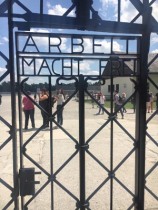 systematically killed. From the moment we walked through the gate and read the words, “arbeit macht frei,” I felt an overwhelming sense of guilt. I knew that thousands of people had walked through those same gates and never walked out, and I knew that I owed it to them to walk through the entire camp no matter how painful it would be. The trip to Dachau opened my eyes to the endless evils that can occur as a result of apathy and complicity, and it made me understand that as witnesses, we need to spread the story of Dachau and protect the memory of those whose lives were lost.
systematically killed. From the moment we walked through the gate and read the words, “arbeit macht frei,” I felt an overwhelming sense of guilt. I knew that thousands of people had walked through those same gates and never walked out, and I knew that I owed it to them to walk through the entire camp no matter how painful it would be. The trip to Dachau opened my eyes to the endless evils that can occur as a result of apathy and complicity, and it made me understand that as witnesses, we need to spread the story of Dachau and protect the memory of those whose lives were lost.
Mahdis Gheibi
 Looking at the belongings and photos of victims made them come alive for me as I felt their sorrow and terrors while walking through the camp. I understood these dehumanized victims of long ago had the same needs, wants and feelings as we do. I feel powerless to help the victims of the past, but I understand now that genocide is not just in the past. In this sense I no longer feel powerless because now I can speak out and make others aware of the dangers of not understanding past tragedies.
Looking at the belongings and photos of victims made them come alive for me as I felt their sorrow and terrors while walking through the camp. I understood these dehumanized victims of long ago had the same needs, wants and feelings as we do. I feel powerless to help the victims of the past, but I understand now that genocide is not just in the past. In this sense I no longer feel powerless because now I can speak out and make others aware of the dangers of not understanding past tragedies.
Mitch Brown
The entire experience was powerful, a mixture of beauty (such as the Russian Orthodox memorial) and horror. In the words of one American soldier who encountered the stench of death upon liberating the camp, “It didn’t even feel as though I was still on the planet.” It wasn’t a faceless monster who committed these sinister crimes against humanity. We have to realize that somewhere deep within all of us there is the human capability to do this. We need to work to make sure that as a people if we recognize these types of things happening again, that we fight back to prevent it.
Ian Zuo
Visiting Dachau in person is a life changing experience for me as I tried to imagine how those prisoners felt when they were there. We are lucky to live in a peaceful period, but it’s our responsibility to know how ugly people can be under certain circumstances, like during war time. We need to admit, even though it’s uncomfortable for us, that human nature includes both kindness and evil, and that war and human rights abuses never end in our world. Looking back to what happened in the past and thinking about history is the first step for us to stop violence and prevent holocausts from happening again.
Rosa Chapman
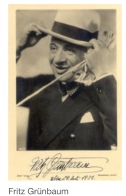 Over 12 years, thousands of innocent lives were tortured and killed mercilessly at Dachau because they were Jews or were against the Nazi regime. Can something positive be rescued from this tragedy? Yes, Fritz Grunbaun: a cabaret artist against the regime, and an Austrian Jew who died January 14, 1941 after one last performance in the camp to fellow prisoners. The SS took his physical freedom but not his art or his mind. No matter how hard your suffering is, always keep your spirit up and share it with others who cannot have it.
Over 12 years, thousands of innocent lives were tortured and killed mercilessly at Dachau because they were Jews or were against the Nazi regime. Can something positive be rescued from this tragedy? Yes, Fritz Grunbaun: a cabaret artist against the regime, and an Austrian Jew who died January 14, 1941 after one last performance in the camp to fellow prisoners. The SS took his physical freedom but not his art or his mind. No matter how hard your suffering is, always keep your spirit up and share it with others who cannot have it.
Angelina Yin
Shortly after stepping through the gates, I found myself alone with my peers already  gone. I was forsaken, lost, and haunted by the whispers of my thoughts. As I strolled along the interior of the museum I heard a child cry, and in that moment my spine tingled at the thought of the screams of pain that once echoed through those same halls. As I wandered past the barbed wire fences, I caught a glimpse of the isolation between the world of the persecuted and the world of the bystanders. How sad that when the 7th Army surveyed civilians of their feelings on Dachau in the 1940s, most of the responses were of ignorance to the camp!
gone. I was forsaken, lost, and haunted by the whispers of my thoughts. As I strolled along the interior of the museum I heard a child cry, and in that moment my spine tingled at the thought of the screams of pain that once echoed through those same halls. As I wandered past the barbed wire fences, I caught a glimpse of the isolation between the world of the persecuted and the world of the bystanders. How sad that when the 7th Army surveyed civilians of their feelings on Dachau in the 1940s, most of the responses were of ignorance to the camp!
Liz Maglio
 My heart is heavy this afternoon. Despite the clear blue skies and birdsong a heavy blanket of sorrow carpets the grounds of Dachau. There is an atmosphere of horror and dread. I feel a profound sadness for the mothers and daughters, for the fathers and sons grandparents and grandchildren and for the people persecuted tortured and murdered for the crime of being different. Anger and fear simmer under my skin and somewhere there is hope, perhaps by bearing witness and spreading the stories of the victims and survivors this atrocity will never stain history again. Never Again.
My heart is heavy this afternoon. Despite the clear blue skies and birdsong a heavy blanket of sorrow carpets the grounds of Dachau. There is an atmosphere of horror and dread. I feel a profound sadness for the mothers and daughters, for the fathers and sons grandparents and grandchildren and for the people persecuted tortured and murdered for the crime of being different. Anger and fear simmer under my skin and somewhere there is hope, perhaps by bearing witness and spreading the stories of the victims and survivors this atrocity will never stain history again. Never Again.
Yasmeen Faris
“The opposite of love is not hate, it is indifference.” – Elie Wiesel
 Prisoners coming in by the thousands, stripped of their belongings, with heads shaved and sanitized of everything they came in with, having to forfeit their names only to be called by numbers for the rest of their lives; citizens of a country losing their right to shower, eat, or pray with dignity due to an opposing way of life than the people in power, left without any means of cleansing themselves physically and spiritually; people being left for dead with no name on a grave, just ashes spread out so that a face could not be attached to the torture that led to the point of death. That is indifference.
Prisoners coming in by the thousands, stripped of their belongings, with heads shaved and sanitized of everything they came in with, having to forfeit their names only to be called by numbers for the rest of their lives; citizens of a country losing their right to shower, eat, or pray with dignity due to an opposing way of life than the people in power, left without any means of cleansing themselves physically and spiritually; people being left for dead with no name on a grave, just ashes spread out so that a face could not be attached to the torture that led to the point of death. That is indifference.
Rafael Alva
The amount of different prisoners from different backgrounds was shocking. And the individuality of the persons interned really showed the gravity of this camp. The amount of priests at the camp stood out for me personally as a Catholic, and the way the memorial showed that focus on the persons heavily impacted me.
Salzburg Conference – 6/17/18 – Day 5
The fifth day of our conference has come and gone, but the lecture topics and accompanying discussions continue to grow in importance. Are nations merely a social construct? If so, what do words such as “Fatherland,” “Motherland,” or even “Homeland” mean? How does our devotion to these terms affect how we see and treat others? How in particular have we seen a Far Right ideological movement in the West gravitate away from traditional anti-Semitism and towards Islamophobia? What kind of intolerance motivates people to believe that Islam only represents violence and hatred? These are all really important questions that the conference compels students to ask themselves and each other.
 One wonderful aspect of the conference has been the opportunity for students to mingle with the faculty and lecturers in “Tea Times.” It’s during these moments that conference participants can relax, let their hair down, and be free to discuss one on one issues and offer opinions that they otherwise may be reluctant to offer during the lecture session. It is, in other words, an extension of the learning process that has both recreational and educational benefits. Was there a question you wanted to ask Dr. Daxner about homeland and national identity? Is there an area of Islamophobia you want Prof. Hafez’s opinion on? The total size of the attendees at this conference is only 24 students, so the seminar type of atmosphere is absolutely conducive to drilling deep into the topics as you get to know the faculty over a cup of coffee or even dinner.
One wonderful aspect of the conference has been the opportunity for students to mingle with the faculty and lecturers in “Tea Times.” It’s during these moments that conference participants can relax, let their hair down, and be free to discuss one on one issues and offer opinions that they otherwise may be reluctant to offer during the lecture session. It is, in other words, an extension of the learning process that has both recreational and educational benefits. Was there a question you wanted to ask Dr. Daxner about homeland and national identity? Is there an area of Islamophobia you want Prof. Hafez’s opinion on? The total size of the attendees at this conference is only 24 students, so the seminar type of atmosphere is absolutely conducive to drilling deep into the topics as you get to know the faculty over a cup of coffee or even dinner.
There also, of course, is time for socializing as West Valley and Central Michigan students came together last night for a BBQ.
 I’ve noticed this year far fewer obstacles in the mingling of these two groups. Perhaps there is greater ideological consensus (last year, close after the
I’ve noticed this year far fewer obstacles in the mingling of these two groups. Perhaps there is greater ideological consensus (last year, close after the election, there was more partisan tension between Bay Area students and Michigan students). Or maybe there are just fewer personality conflicts. Whatever the reason, I’ve noticed in the individual groups a willingness on the part of students to work together as a whole to get the poster project done.
election, there was more partisan tension between Bay Area students and Michigan students). Or maybe there are just fewer personality conflicts. Whatever the reason, I’ve noticed in the individual groups a willingness on the part of students to work together as a whole to get the poster project done.
 These posters are due tomorrow as each of the three groups race to finish them before the 7:30 pm deadline. Not only is there a poster to be drawn which lays out their global citizenship proposal, they must also each take turns making a presentation. I’ll give you an update on that tomorrow.
These posters are due tomorrow as each of the three groups race to finish them before the 7:30 pm deadline. Not only is there a poster to be drawn which lays out their global citizenship proposal, they must also each take turns making a presentation. I’ll give you an update on that tomorrow.
In the meantime, here are some photos of our students both at the Schloss and in town.
Salzburg Conference – 6/18/18 – Day 6
 Another fascinating day of speakers at the conference. One speaker further developed an earlier theme she laid out on the urban ideal and migration to now include spatial disparities. Our second speaker clearly and articulately showed the history of Islamophobia in the west and how it is being used so effectively today by western European leaders and American politicians, including the President of the U.S. There was some push back from a student or two about whether that was a fair characterization of President Trump, but in the manner that GCA’s speakers are well known for, the lecturer respectfully pointed out why he disagreed and had the factual basis to show how Trump does indeed promote Islamophobia.
Another fascinating day of speakers at the conference. One speaker further developed an earlier theme she laid out on the urban ideal and migration to now include spatial disparities. Our second speaker clearly and articulately showed the history of Islamophobia in the west and how it is being used so effectively today by western European leaders and American politicians, including the President of the U.S. There was some push back from a student or two about whether that was a fair characterization of President Trump, but in the manner that GCA’s speakers are well known for, the lecturer respectfully pointed out why he disagreed and had the factual basis to show how Trump does indeed promote Islamophobia.
The most exciting event of Day 6 is the poster presentation.
 There were no Power Point presentations or speakers getting up in front of the room. This was definitely old school as students working in their groups could use nothing more than a poster. Each group had a corner of the room and only a poster to work with. As conference participants mingled from group to group, two presenters would stand next to the poster explaining the action proposal and answering questions. They would then be replaced by two other presenters after 5 minutes so that everyone in the group had the opportunity to present. Students from the two colleges attending the conference were divided evenly into the groups, so each of the three posters had WVC student participation (which is why I am posting photos of all three posters and groups).
There were no Power Point presentations or speakers getting up in front of the room. This was definitely old school as students working in their groups could use nothing more than a poster. Each group had a corner of the room and only a poster to work with. As conference participants mingled from group to group, two presenters would stand next to the poster explaining the action proposal and answering questions. They would then be replaced by two other presenters after 5 minutes so that everyone in the group had the opportunity to present. Students from the two colleges attending the conference were divided evenly into the groups, so each of the three posters had WVC student participation (which is why I am posting photos of all three posters and groups).
 Before you start reading the posters, let me give you some context. Students were required to present a particular plan of action to advance the conservation of global citizenship based on what they have learned over the last 5 days. For instance, would the action plan focus on human rights? On globalization? On promoting awareness of world poverty? Ethnic and religious conflict in the developing world? Once the topic was decided upon, the groups would zero in on a particular audience. As these are college students, all three groups put together an action plan that would primarily be based at the college level, but the reach of the audience differed between the groups. Some focused on college students, while others targeted elementary/secondary education kids and/or the general community.
Before you start reading the posters, let me give you some context. Students were required to present a particular plan of action to advance the conservation of global citizenship based on what they have learned over the last 5 days. For instance, would the action plan focus on human rights? On globalization? On promoting awareness of world poverty? Ethnic and religious conflict in the developing world? Once the topic was decided upon, the groups would zero in on a particular audience. As these are college students, all three groups put together an action plan that would primarily be based at the college level, but the reach of the audience differed between the groups. Some focused on college students, while others targeted elementary/secondary education kids and/or the general community.
What I found particularly interesting was the give and take these groups went through over the 5 days it took to develop an action plan. The group that I was the adviser for on the first day argued for 20 minutes about what topics the group should discuss. It was a warning sign to be sure that this was a group with too many cooks. And the dynamics playing out were not just CMU vs. WVC but also WVC students in conflict with each other. But by the second meeting I found my role as an adviser no longer required throughout the meeting as the group had come to develop an atmosphere of respect and collegiality. Occasional conflict still arose, of course, and I might be called in to help resolve a contentious point (though I always let them work it out themselves rather than put forward my own viewpoint), but by the third day they definitely had their “sh*t together” and knew exactly what they wanted to do in making the poster. By the 5th day they were dancing around the room to music on someone’s IPhone.
 Rafael, Shantik, and Anahita share a moment together during the poster presentations.
Rafael, Shantik, and Anahita share a moment together during the poster presentations.
While the posters below lack the oral explanation group participants provided during the presentation, the photos of each can give you a sense of the tremendous creativity that students put into these projects.

Rafael, Andrea, Hannah, Ana, and Nguyen’s group.


Angelina, Mahdis, Savanah, Rosa, Ian, and Mitch’s group.

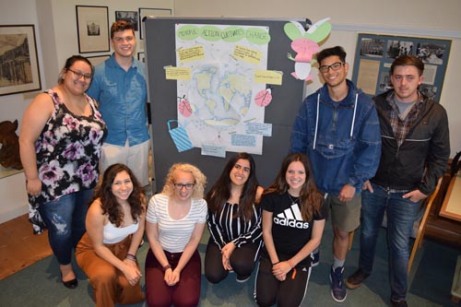
Liz, Yasmeen, Anahita, Shantik and Aaron’s group.

More photos from the presentations:
Salzburg Conference – 6/19/18 – Day 7
After a wonderful week in Salzburg the conference came to a close today. It was a bittersweet day as we prepared to say goodbye to our hosts but looked forward to returning home to our families.
 The day began with a final session from the lecturers as they wrapped up the conference with some final questions for the participants. What have you learned over the last six days, and more important what will you take home with you from the seminar? These students (and their advisers) are left with an important task. Are we prepared to take on the responsibilities of a global citizen? Are we committed to making positive change in our communities and on our campuses? What will we do to make it happen? What are we willing to sacrifice? To contribute, especially in time and energy?
The day began with a final session from the lecturers as they wrapped up the conference with some final questions for the participants. What have you learned over the last six days, and more important what will you take home with you from the seminar? These students (and their advisers) are left with an important task. Are we prepared to take on the responsibilities of a global citizen? Are we committed to making positive change in our communities and on our campuses? What will we do to make it happen? What are we willing to sacrifice? To contribute, especially in time and energy?
A final tea break gave students the opportunity to ponder these questions among themselves, as well as other heavy issues (such as whether water is wet.)
Plenty of time was left in the day for final exploration of Salzburg and the surrounding communities. Some paid a visit to local museums that they had not yet gotten around to.
I spent the day hiking the trails in the hills above the city and enjoying the beautiful Austrian weather as we were blessed with cool spring temperatures after a thunderstorm the night before washed away the heat.
A final reception, concert and banquet was on the schedule for the last night. The reception was at the Max Reinhardt Library, a two story room with a secret staircase and wall to wall bookshelves with a design based on St. Gallen’s monastery library in Switzerland.
After the reception, we were all led down to the Great Hall on the  ground floor for a concert by German pianist Christoph Declara and – for the first time in the seminar’s history – an accompanying soprano soloist (Regine Sturm). They performed works by Schubert, Hugo Wolf, and Liszt. It was an incredible performance which left us all enthralled not just with their talent, but also the unique ability of singing love songs in German (I guess Mozart was right that it could be done!)
ground floor for a concert by German pianist Christoph Declara and – for the first time in the seminar’s history – an accompanying soprano soloist (Regine Sturm). They performed works by Schubert, Hugo Wolf, and Liszt. It was an incredible performance which left us all enthralled not just with their talent, but also the unique ability of singing love songs in German (I guess Mozart was right that it could be done!)
The night ended with a formal banquet (rather than the normal buffet dinner) as we were served a delicious three course meal.
Savoring the three different desserts brought to us, we shared our favorite stories of Salzburg sites we had seen and seminar lectures we had heard. It was a beautiful ending to a beautiful week in Salzburg.
So what did our students get out of it? Well, I hope to add their comments in the coming days to this blog as they share their experiences.
Let me say for myself that being the Study Abroad Program Adviser to Salzburg for these last two years has been an amazing experience for me personally. I have had the opportunity to watch our student participants grow not just during the week of the conference, but in the months afterwards as they took on greater leadership responsibilities on campus. I have no doubt that the current crop of students will follow that same path as our 2017 Salzburg Alumni.
This is an important program, and one that needs to maintain broad support on campus. For that reason, this will be my last year as the Adviser to Salzburg as I am eager to see other West Valley College faculty participate in and benefit from the same life changing experience I have had these last two years.

The group goes crazy as Rafael does his levitation trick.
Without a doubt, it’s been both a privilege and an honor being the adviser to students who have committed themselves to promoting global citizenship and fostering international goodwill and understanding. Thanks for reading this blog.
Tim Kelly
Student Reflections
Aaron Minkoff
For some people, being a Global Citizen is to be conscious of what goes on in the world, while for others it is learning about world problems, either through discussions or social media posts and hashtags. My view of a Global Citizen is that of a person who acts on his/her beliefs through concrete, direct approaches such as through volunteerism. I learned a lot about myself when debating the topic of education, empowerment, and action. I found that I can be blunt, aggressive, and tone deaf as to how others “feel” with regards to being a Global Citizen. Not everyone has the same level of time nor the same degree of passion that is necessary for school, work, family and friends, and volunteering. I believe that the debate was necessary to bring about self-reflection and to challenge the opinions and perspectives not just of other people, but also of myself.
Mitch Brown
My participation in the Global Citizenship Seminar…expanded my understanding of the political landscape abroad as well as in other areas of the United States. The seminar classes were very interesting. The Global Citizenship Alliance went out of its way to get very competent instructors to introduce topics to us and spark conversation amongst our smaller groups. While I thought the Seminar staff were a bit left on the political scale even for our left leaning students it was very intriguing to hear some of their opinions on things. The trip was very meaningful to me and I learned a tremendous amount from it.
Andrea Morrone
My trip to Austria was inspiring, breathtaking, life changing. I first applied for this scholarship because I had never been out of the United States and the concept of getting to study abroad was something of a dream to me. I never imagined that I would be able to travel Europe let alone travel with a group of people who would change my perspective and my life. During the ten days that I was abroad not only did I make new, life long friends, but I learned lessons that I will carry with me throughout my academic and personal life. I didn’t realize that I would enter Austria as one person, and exit as another.





